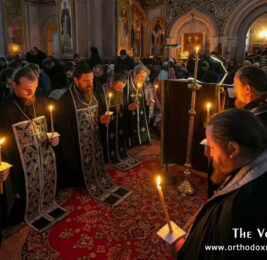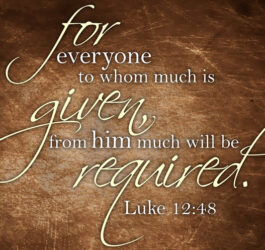 by Chris Banescu
by Chris Banescu
In the midst of the ongoing OCA moral crisis we hear calls, especially from some clergy and many of our hierarchs, to forgive all those in the OCA leadership and administration who have for years, either through malfeasance or incompetence enabled the abuses, fraud, misconduct, and pillaging of God’s house. We are constantly reminded that our duty as Christians is to quickly and unconditionally forgive those who have mistreated others, lied, appropriated Church funds for personal luxury, stole money intended for widows, orphans, and the poor, covered up their misdeeds, and conducted themselves in an ethically reprehensible manner without a hint of remorse, repentance, and accountability. Before the people have had a chance to understand and find out what exactly has happened, who was really responsible, how much was wasted and stolen, how long this went on, who was hurt, who benefited, who lied, and who covered up their crimes, we are being told to forgive unconditionally and move on, “for the good of the Church.”
Is this call for forgiveness without truth, without repentance, without personal accountability, and without real contrition truly the Christian approach as reflected in the Scriptures and the Orthodox Moral Tradition? Are we being fooled into accepting a watered down version of forgiveness that distorts the fullness of the teaching of Christ regarding those who trespass and neither admit their culpability nor repent of their crimes?
The Gospels bear witness to many instances where Christ taught by word and deed that repentance is needed for God to act and forgiveness be given. The Apostle and Evangelist Luke records Christ’s comments to His disciples regarding the need for repentance before forgiveness:
“Take heed to yourselves. If your brother sins against you, rebuke him; and if he repents, forgive him. And if he sins against you seven times in a day, and seven times in a day returns to you, saying, “I repent,” you shall forgive him.” (Luke 17:3-4)
Also, the Scriptures tell us of another powerful lesson of repentance as a prerequisite for forgiveness. While Christ is hanging on the cross to either side of him are two thieves. St. Luke tells us that one of the criminals blasphemed Jesus saying “If You are the Christ, save Yourself and us.” (Luke 23:39) However, the other thief rebuked the other saying: “Do you not even fear God, seeing you are under the same condemnation? And we indeed justly, for we receive the due reward of our deeds; but this Man has done nothing wrong.” (Luke 23:40-41) Then the repentant thief asks of Jesus “Lord, remember me when You come into Your kingdom.” (Luke 23:42) Christ responds to the remorseful thief by promising him “Assuredly, I say to you, today you will be with Me in Paradise.” (Luke 23:42) Jesus only granted forgiveness to the repentant thief who admitted his crimes and pleaded for mercy, but He did not absolve the unrepentant criminal.
Jesus only granted forgiveness to the repentant thief who admitted his crimes and pleaded for mercy, but He did not absolve the unrepentant criminal.
St. Luke also describes that while Jesus was being crucified He said “Father, forgive them, for they do not know what they do.” (Luke 23:34) This passage is often quoted and mentioned by many as proof that we must forgive anyone for everything at all times, without any preconditions, change of heart, or contrition on the part of the offenders. But notice that Christ prayed to His Father to forgive those that did not know what they were doing. Indeed many of the soldiers and underlings that physically restrained, beat, insulted, whipped, spat upon, crucified, speared, and ultimately killed Jesus did not know what they were doing. They were under orders from their rules and superiors to carry out the unjust sentence and horrific punishment on a innocent man. Their culpability and responsibility was small because none of them understood or knew that they were torturing and killing a sinless Messiah, the only begotten Son of God, light of light, true God of true God. Also anyone in the crowds at Golgotha who had never heard of Christ, had not listened to His sermons and parables, or witnessed His miracles would indeed not know what they were doing when they taunted Jesus and cheered on the crucifixion.
Christ prayed to His Father to forgive those that did not know what they were doing.
However, just a short distance away from the cross also stood many of the people who just a few days earlier had welcomed Jesus to Jerusalem cheering: “Hosanna to the Son of David! Blessed is He who comes in the name of the Lord! Hosanna in the highest!” Some of those same people now passed by and “blasphemed Him, wagging their heads and saying, ‘You who destroy the temple and build it in three days, save Yourself! If You are the Son of God, come down from the cross.'” (Matthew 27:39-40) Presumably many of those followers had witnessed Christ’s miracles and had heard His teachings. They would have known this was no ordinary man or false prophet, but truly the Messiah, the Lord. They did know and should have understood the unimaginable evil and travesty they were observing. Were they also automatically forgiven by God?
Near the cross of Christ also stood members of the Sanhedrin, the chief priests, scribes, and elders. They were also watching, mocking Christ, and cheering on the painful torture and unjust murder of their Messiah. The Gospel of Matthew records:
“Likewise the chief priests also, mocking with the scribes and elders, said, “He saved others; Himself He cannot save. If He is the King of Israel, let Him now come down from the cross, and we will believe Him. He trusted in God; let Him deliver Him now if He will have Him; for He said, ‘I am the Son of God.'” (Matthew 27:41-43)
These chief priests and elders did know who Christ was, had seen or received testimonies of the many healings and miracles Jesus performed, and had heard Christ talk and preach. All of them knew this was no ordinary man or false prophet. At a minimum these religious leaders knew Christ was a true prophet, a man of God, and innocent of all the false charges against him. They knew Christ was a holy man, yet they conspired to have him killed. While Christ’s innocent blood was being shed and His life slowly and painfully drained from His body while being nailed to the cross, these “men of God” did absolutely nothing to stop it. These priests, scribes, and elders showed no mercy, no love, no remorse, and repented of nothing. Did Christ include them in His prayer? Were those chief priests, scribes, and elders also forgiven by God?
Perhaps no parable is more appropriate to our present situation than the Parable of the Talents recorded in the Gospel of St. Matthew. Christ tells us what happens to the three servants who are each entrusted with five (5) talents, two (2) talents, and one (1) talent.
Upon the Lord’s return He settles the accounts with each of the three servants. The first doubles the five (5) talents to ten (10) talents and he is praised: “Well done, good and faithful servant; you were faithful over a few things, I will make you ruler over many things. Enter into the joy of your lord.” (Matthew 25:21) The second servant gives back to his master the original two (2) talents, plus two (2) more talents. The Lord’s pleasure is again evident: “Well done, good and faithful servant; you have been faithful over a few things, I will make you ruler over many things. Enter into the joy of your lord.” (Matthew 25:23)
Finally, the third servant steps forward and simply returns the same one (1) talent that he was given, saying: “Lord, I knew you to be a hard man, reaping where you have not sown, and gathering where you have not scattered seed. And I was afraid, and went and hid your talent in the ground. Look, there you have what is yours.” (Matthew 25:24)
The Lord’s displeasure and anger is palpable. The Master severely admonishes the third servant:
“You wicked and lazy servant, you knew that I reap where I have not sown, and gather where I have not scattered seed. So you ought to have deposited my money with the bankers, and at my coming I would have received back my own with interest. So take the talent from him, and give it to him who has ten talents. For to everyone who has, more will be given, and he will have abundance; but from him who does not have, even what he has will be taken away. And cast the unprofitable servant into the outer darkness. There will be weeping and gnashing of teeth.” (Matthew 25:26-30)
Does this language from the Lord show anything but condemnation? Is there any forgiveness in His tone and warnings? Can anyone find any tolerance for the incompetence and mismanagement of those entrusted with God’s treasure?
Will the Synod be able to return even the one (1) talent entrusted to them? Will the OCA be able to give back even half of a talent?”
Does forgiveness require us to cover past malfeasance as if it never happened?
Let me put it another way. Imagine that you invite a small group of supposedly righteous and Christian men into your home. Trusting them to be men of good character and integrity you entrust them with the keys to your house and car, and give them free reign to come and go as they please. You then leave for a short vacation with your wife and children. Upon your return you discover that these man have pillaged your pantry, destroyed your garden, wrecked the family car, and sold off most of your furniture and valuables and kept the money. Not satisfied with the loot, the thieves are now holding your family hostage and demanding that you pay them more, claiming it was all a mistake, and that you should get on with your life; never mind the missing furniture, ruined garden, damage to your car, and chaos and devastation they have caused.
These abusers and thieves insist on staying in your home and keeping the keys to the front door and the car. They have never admitted responsibility, repented, asked for forgiveness, offered or attempted to make amends, or repair your car, buy you new furniture, or re-plant your garden, or give back the money they stole by selling your valuables without your knowledge and permission. They tell you that you should forgive and trust them; that not doing so would not be right and Christian.
Would trusting the future of your family to the gang be wise?
Would believing the promises of those who looted the house be prudent?
Does forgiveness require us to cover past malfeasance as if it never happened?
This article was originally published on OCANews.org:
Forgiveness Without Repentance?
www.ocanews.org/news/Banescu8.28.08.html



